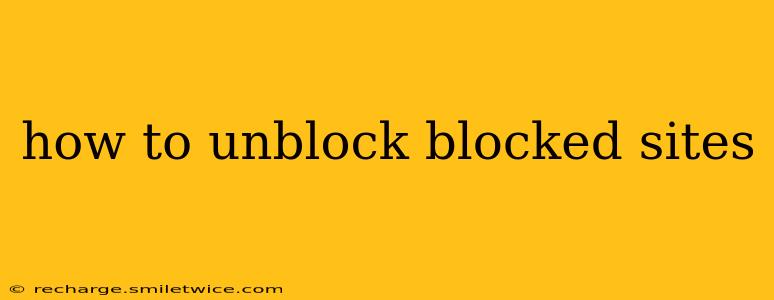The internet is a vast and open space, but sometimes access to certain websites is restricted. Whether it's your workplace, school, or a public Wi-Fi network, encountering blocked sites can be frustrating. This comprehensive guide will explore various methods to unblock websites, covering both simple techniques and more advanced solutions. We'll delve into the reasons behind website blocking and provide practical strategies to regain access.
Why Are Websites Blocked?
Understanding why a website is blocked is the first step towards unblocking it. Several reasons contribute to website restrictions:
-
Network Policies: Many organizations (schools, workplaces, internet service providers) implement firewalls and content filters to restrict access to specific websites deemed inappropriate, unproductive, or potentially harmful. This is often to maintain productivity, protect users, or comply with legal requirements.
-
Government Censorship: In some countries, governments actively censor internet content, blocking access to websites critical of the regime, those promoting opposing viewpoints, or containing material deemed offensive.
-
Copyright Infringement: Websites offering pirated content or illegal downloads are often blocked by copyright holders or internet service providers.
-
Security Concerns: Websites known for hosting malware or engaging in phishing activities might be blocked to protect users from security threats.
How to Unblock Blocked Websites: Methods and Techniques
Several methods can help you access blocked websites, each with its own advantages and disadvantages:
1. Using a VPN (Virtual Private Network)
A VPN is arguably the most effective and widely used method to unblock websites. A VPN masks your IP address, making it appear as though you're accessing the internet from a different location. This circumvents geographical restrictions and bypasses most network firewalls. Important Note: While VPNs offer strong privacy benefits, choose reputable providers with a proven track record of security.
2. Using a Proxy Server
Similar to a VPN, a proxy server acts as an intermediary between your device and the internet. It routes your traffic through a different server, masking your IP address. Proxies are generally less secure than VPNs, offering less robust encryption. Free proxy servers might be slower and less reliable.
3. Using a Tor Browser
The Tor Browser is designed for enhanced privacy and anonymity. It routes your internet traffic through a series of encrypted relays, making it difficult to trace your online activity. This can help you access blocked websites, especially those blocked due to censorship. However, Tor can be slower than regular browsing and might not be suitable for all types of websites.
4. Using a different DNS Server
Your Domain Name System (DNS) server translates domain names (like google.com) into IP addresses. Switching to a public DNS server, such as Google Public DNS or Cloudflare DNS, might allow you to access blocked websites if your network's DNS server is actively blocking them.
5. Checking for Website Errors
Sometimes, a website might appear blocked due to a temporary error or outage. Try checking the website's status on websites like DownDetector to rule out technical problems.
Frequently Asked Questions (FAQs)
Is using a VPN illegal?
Using a VPN is generally legal in most countries, but there are exceptions. Some countries restrict or ban VPN usage, so it's crucial to check your local laws before using one. Additionally, using a VPN for illegal activities remains illegal.
Are free VPNs safe?
Free VPNs often compromise on security and privacy. They may log your browsing data, inject ads, or even contain malware. While convenient, opting for a reputable paid VPN is generally recommended for better security and privacy.
Can I unblock all websites with a VPN?
While VPNs are highly effective, some sophisticated network firewalls can still detect and block VPN traffic. The effectiveness of a VPN also depends on the specific VPN provider and the level of sophistication of the blocking mechanism.
What are the risks of using a proxy server?
Proxy servers can be less secure than VPNs. They may not encrypt your traffic as robustly, leaving your data vulnerable to interception. Free proxy servers are particularly risky and should be avoided.
This guide provides several options for unblocking websites. Remember to always prioritize security and privacy when choosing a method and be mindful of your local laws and regulations. The best approach depends on your specific situation and the level of security you require.
